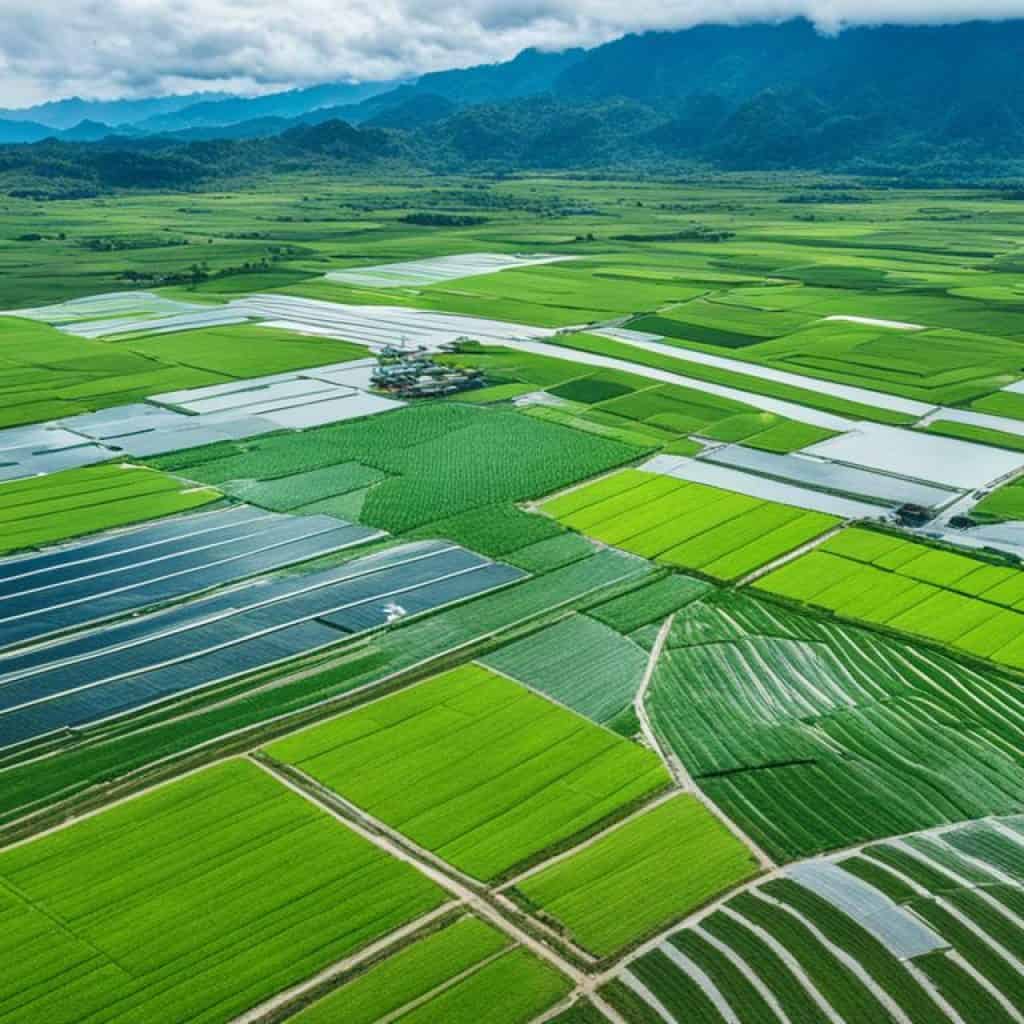Are you searching for the best investment opportunities in the Philippines? Curious to know which investments offer high yields and long-term profitability? The Philippines, with its strategic location and a growing economy, presents a lucrative market for both domestic and foreign investors. But where should you start?
Join us as we explore the top investment options in the Philippines and discover how you can unlock the potential of this thriving market. From real estate and business process outsourcing to renewable energy and the digital economy, we’ll dive into the sectors that offer the best opportunities for growth and returns.
Key Takeaways:
- Discover the best long-term investments in the Philippines.
- Explore the high-yield investment opportunities available in the country.
- Learn about the lucrative industries and growth sectors attracting foreign direct investment.
- Uncover the investment options, from business process outsourcing to renewable energy.
- Find out how to navigate the digital economy and capitalize on e-commerce and FinTech.
The Benefits of Investing in the Philippines
Investing in the Philippines offers numerous advantages that make it a compelling destination for both domestic and foreign investors. Let’s explore some of the key benefits:
- A Skilled Workforce: The Philippines is renowned for its talented and English-proficient workforce. With a strong emphasis on education and a high literacy rate, the country offers a pool of skilled professionals across various industries.
- Growing Economy: The Philippine economy has shown consistent growth, outperforming expectations and attracting investor confidence. In 2021, the country experienced a 5.7 percent growth rate, exceeding government targets.
- Large Consumer Market: With a population of over 110 million people, the Philippines presents a vast consumer base. This provides ample opportunities for businesses to tap into a diverse market.
When it comes to investment options, the Philippines offers a range of attractive sectors to consider:
- Philippine Stock Market: The Philippine stock market provides opportunities for investors seeking to capitalize on the country’s economic growth. With potential for both short-term gains and long-term growth, investing in the Philippine stock market can be a rewarding choice.
- Real Estate Investments: The real estate market in the Philippines has consistently shown promising returns. Whether it’s residential, commercial, or industrial properties, investing in real estate can yield high returns over time.
To further emphasize the benefits of investing in the Philippines, consider the following quote:
“The Philippines offers a compelling combination of a skilled workforce, a growing economy, and a large consumer market. Investing in sectors such as the Philippine stock market and real estate presents opportunities for attractive returns and long-term growth.”
– Real Estate Investor
Investing in the Philippine Stock Market
One of the investment options in the Philippines is the Philippine stock market. It is a vibrant marketplace where individuals and businesses can buy and sell shares of publicly listed companies. Investing in stocks can provide potential returns through dividend payments and capital appreciation. It’s important to note that the stock market carries inherent risks, and investors should conduct thorough research and seek professional advice before making investment decisions.
| Advantages of Investing in the Philippine Stock Market | Risks of Investing in the Philippine Stock Market |
|---|---|
|
|
Investing in the Philippine stock market requires careful consideration of individual risk tolerance, investment goals, and a thorough understanding of market dynamics. It is advisable to consult with a licensed financial advisor to ensure informed decision-making.
Investing in the Philippine stock market comes with potential risks and rewards. It is essential for investors to evaluate their financial goals, assess the market conditions, and seek guidance to make informed investment decisions.
Lucrative Industries for Foreign Direct Investment
Investing in the Philippines offers a wealth of opportunities in various industries, positioning it as a prime destination for foreign direct investment. The country’s profitable sectors attract entrepreneurs and investors looking to capitalize on its vibrant economy and growth potential. Here are some of the lucrative industries that offer high returns:
Agriculture
The agricultural sector in the Philippines is a key contributor to the nation’s growth, providing employment and contributing to GDP. With a rich agricultural heritage and favorable climate, investing in agriculture offers immense potential. Key areas of investment include the production and export of rice, coconuts, sugarcane, and other tropical crops.
Manufacturing
The manufacturing sector in the Philippines is a robust and rapidly growing industry. It provides opportunities for investors to tap into the country’s skilled workforce and strategic location. The manufacturing industry encompasses various subsectors, including electronics, automotive, textiles, and food processing. Investments in manufacturing can generate substantial returns and contribute to job creation.
Tourism
The Philippines is renowned for its natural beauty and cultural heritage, making tourism a lucrative sector for investment. With a multitude of pristine beaches, UNESCO World Heritage sites, and vibrant cities, the country attracts millions of international tourists annually. Investments in hotels, resorts, transportation, and entertainment facilities can capitalize on the growth of the tourism industry and the increasing number of visitors.
Business Process Outsourcing
The Philippines has established itself as a global leader in the business process outsourcing (BPO) industry. With a large pool of English-speaking talent, the country provides cost-effective solutions for various outsourcing needs, including call centers, IT services, and back-office operations. Investing in BPO companies can yield significant returns and leverage the country’s strengths in this sector.
Energy
The energy sector in the Philippines offers lucrative investment opportunities, particularly in renewable energy. The country’s commitment to reducing carbon emissions and increasing the share of renewable energy in its energy mix opens doors for investors in wind, solar, hydro, and geothermal power projects. Investing in renewable energy not only provides high returns but also contributes to sustainable development and environmental conservation.
Infrastructure Development
The Philippines has a strong focus on infrastructure development, with the government implementing various projects to improve connectivity, transportation, and urban development. Investments in infrastructure development, such as roads, ports, airports, and telecommunications, can yield substantial returns and support the country’s economic growth.
| Industry | Investment Opportunities |
|---|---|
| Agriculture | Production and export of rice, coconuts, sugarcane, and tropical crops. |
| Manufacturing | Electronics, automotive, textiles, and food processing. |
| Tourism | Hotels, resorts, transportation, and entertainment facilities. |
| Business Process Outsourcing | Call centers, IT services, and back-office operations. |
| Energy | Renewable energy projects in wind, solar, hydro, and geothermal power. |
| Infrastructure Development | Roads, ports, airports, and telecommunications. |
Investment Options in the Philippines
When considering investment opportunities in the Philippines, foreign companies have several options to establish their presence. Whether it’s through corporations, branch offices, representative offices, or regional headquarters, each investment option comes with its own set of requirements and benefits.
Corporations, for instance, provide the flexibility of choosing between Filipino or foreign equity ownership. This allows companies to tailor their investment structure according to their specific needs and preferences.
Investing in the Philippines offers potential for long-term growth and profitability. The country’s growing economy, strategic location in the ASEAN region, and liberalized foreign investment laws make it an attractive destination for businesses looking for sustainable returns.
“The best long-term investments are those that align with your business goals and have the potential to grow and thrive in the local market. By carefully considering your investment options in the Philippines, you can unlock opportunities that will contribute to your long-term success.”
With a diversified economy and a skilled workforce proficient in English, the Philippines presents a wide range of sectors to invest in. Whether it’s the booming Philippine stock market, the lucrative real estate industry, or the thriving business process outsourcing sector, there are investment options to suit various preferences and risk appetites.
Investment Options Overview:
| Investment Option | Requirements | Benefits |
|---|---|---|
| Corporations | Fewer restrictions on equity ownership, flexibility in organizational structure | Full control over business operations, potential for higher returns |
| Branch Offices | Parent company assumes full liability, simplified setup process | Access to local market, closer integration with parent company |
| Representative Offices | Limited scope of activities, no commercial transactions allowed | Establishing local presence, market research and coordination |
| Regional Headquarters | Serve as a central hub for subsidiary companies within the ASEAN region | Streamlined coordination, access to regional markets |
By selecting the most suitable investment option in the Philippines, businesses can tap into the country’s growing economy, consumer market, and investment-friendly environment. Whether you’re looking for short-term gains or aiming for long-term success, the Philippines offers opportunities that align with your investment objectives.

Business Process Outsourcing in the Philippines
The business process outsourcing (BPO) industry in the Philippines plays a crucial role in driving the country’s economy and offers high-yield investment opportunities. This industry has transformed from traditional call center outsourcing to encompass a wide range of knowledge process outsourcing (KPO) services. These services include IT outsourcing, animation game development, financial research, software development, and data analytics.
One of the key advantages of investing in business process outsourcing in the Philippines is the availability of a proficient English-speaking workforce. Filipino professionals are highly skilled and well-versed in English, making communication with global clients seamless.
Moreover, the Philippines offers attractive tax incentives for BPO companies, making it an ideal destination for those seeking high returns on investment. The government provides tax breaks, exemptions, and grants to encourage the growth of the BPO industry and attract foreign investors.
The business process outsourcing industry in the Philippines is projected to continue its upward trajectory, driven by the country’s competitive advantages, such as its strong communication skills, cultural compatibility with Western markets, and cost-effective solutions.
Investing in business process outsourcing in the Philippines provides an opportunity to tap into a growing industry with a strong foothold in the global market. As more businesses worldwide outsource their operations to maximize efficiency and cost-effectiveness, the demand for BPO services is expected to rise.
By investing in the Philippines’ BPO industry, businesses can leverage the country’s skilled workforce and favorable business environment to achieve high yields and long-term profitability.
Benefits of Investing in Business Process Outsourcing in the Philippines:
- Access to a proficient English-speaking workforce
- Attractive tax incentives and government support
- Wide range of KPO services available
- Cost-effective solutions for global businesses
- Opportunity to tap into a growing industry with high demand
To further illustrate the potential of the business process outsourcing industry in the Philippines, consider the following data:
| Year | Total Revenue of BPO Industry (USD) | Contribution to GDP | Employment Generated |
|---|---|---|---|
| 2019 | $26.3 billion | 8.6% | 1.23 million |
| 2020 | $27.1 billion | 8.9% | 1.19 million |
| 2021 | $29.1 billion | 9.3% | 1.25 million |
As shown in the table, the revenue generated by the BPO industry in the Philippines has been consistently increasing, contributing significantly to the country’s GDP and providing employment opportunities for millions of Filipinos.
Investing in business process outsourcing in the Philippines is a strategic decision that allows businesses to capitalize on the country’s competitive advantages and seize lucrative opportunities in the global market.
The Role of the Electronics and Semiconductor Industry
The electronics and semiconductor industry plays a crucial role in driving the economy of the Philippines. With a significant market share in the global BPO industry, the country offers excellent investment opportunities in areas such as semiconductor manufacturing services and electronics manufacturing. The industry leverages the Philippines’ skilled talent pool, low labor costs, and government incentives to attract foreign companies seeking to tap into its immense growth potential.
Investing in Philippine businesses in the electronics and semiconductor industry can lead to substantial returns and contribute to the country’s economic development. The sector benefits from a well-established supply chain and well-integrated technology infrastructure.
Skilled Talent Pool and Low Labor Costs
The electronics industry in the Philippines flourishes due to the availability of a highly skilled workforce. The country produces a large number of engineering and technical graduates each year, providing companies with a pool of talent capable of driving innovation and growth. Moreover, the lower labor costs in the Philippines compared to other countries make it an attractive investment destination for the electronics and semiconductor industry.
Government Incentives and Support
The Philippine government offers various incentives and support programs to encourage investments in the electronics and semiconductor sector. These incentives include tax breaks, grants, and assistance in acquiring necessary permits and licenses. Such initiatives aim to attract foreign investors and stimulate the industry’s growth.
The government also places significant emphasis on research and development, providing funding opportunities for companies in the sector. This focus on innovation further enhances the competitiveness of the electronics and semiconductor industry in the global market.
Collaboration and Investment Opportunities
Foreign companies can explore collaboration with local businesses and establish partnerships in the Philippines’ electronics and semiconductor industry. By leveraging the country’s existing infrastructure and expertise, foreign investors can contribute to the sector’s growth while gaining access to the country’s expanding market.
Investing in Philippine businesses in the electronics and semiconductor industry brings advantages such as cost savings, shortened lead times, and proximity to other Asian markets. The industry offers opportunities for joint ventures, acquisitions, and technology transfer, enabling companies to tap into the Philippines’ vibrant and evolving tech ecosystem.
Investment in Semiconductor Manufacturing Services
The semiconductor manufacturing services sector in the Philippines is particularly attractive for investment. The country boasts a robust ecosystem that covers the entire semiconductor manufacturing value chain. This includes integrated circuit (IC) design, testing, assembly, and packaging. The industry’s growth potential, combined with the Philippines’ strategic location, makes it a promising investment avenue for both local and foreign businesses.
Table: Semiconductor Manufacturing Services Investment Overview
| Investment Opportunities | Advantages |
|---|---|
| IC Design | – Highly skilled engineering talent pool – Competitive labor costs – Access to advanced design technologies |
| Testing and Assembly | – Established supply chain – Strong collaboration with global partners – Quality assurance and compliance |
| Packaging | – Innovative packaging solutions – Proximity to global markets – Efficient logistics infrastructure |
Investors in semiconductor manufacturing services can take advantage of the Philippines’ favorable investment climate and ecosystem to drive growth and innovation in this thriving industry.
“Investing in the electronics and semiconductor industry in the Philippines presents lucrative opportunities for foreign investors. The sector’s strong market presence, skilled workforce, and government support make it an attractive destination for businesses looking to tap into the country’s growth potential. Collaborating with local partners and leveraging government incentives can lead to significant returns on investment.” – [Expert Name]
Investing in Renewable Energy in the Philippines
Renewable energy is a promising sector for investment in the Philippines, offering a sustainable and lucrative opportunity. With a growing demand for clean energy and the government’s commitment to reducing dependence on fossil fuels, investing in renewable energy projects can lead to long-term returns and contribute to the country’s sustainable development goals.
The Philippines has untapped potential in renewable energy, particularly in geothermal and solar power. Geothermal energy, in particular, has experienced significant growth in recent years, thanks to the country’s abundant geothermal resources. The Philippines ranks second in the world in geothermal energy production, making it an attractive investment destination for geothermal power projects.
The government of the Philippines has enacted laws allowing 100% foreign ownership of renewable energy projects. This regulatory framework provides an attractive investment environment for foreign investors interested in developing renewable energy infrastructure in the country. Opportunities exist for investment in large-scale renewable energy projects, including solar farms and wind farms, as well as small-scale projects like rooftop solar installations.
Investing in renewable energy in the Philippines not only offers financial returns but also contributes to sustainable development and environmental preservation. By supporting renewable energy projects, investors can help reduce carbon emissions, combat climate change, and promote a cleaner and greener future for the Philippines.
Benefits of Investing in Renewable Energy in the Philippines:
- Long-term and stable returns
- Contribution to sustainable development and environmental conservation
- Ability to tap into abundant renewable energy resources
- Opportunities for technological advancements and innovation
- Support for the Philippines’ renewable energy goals
Investing in renewable energy in the Philippines aligns with global efforts to transition to a clean and sustainable energy future. With its favorable investment environment, abundant resources, and growing demand for clean energy, the Philippines presents a promising market for renewable energy investment.
| Renewable Energy Investment Opportunities in the Philippines | Projected Returns | Investment Requirements |
|---|---|---|
| Large-scale solar power projects | High | Land acquisition, permits, and capital investment |
| Geothermal power projects | Moderate to high | Technical expertise, exploration, and drilling |
| Small-scale rooftop solar installations | Moderate | Installation costs and grid connection |
Agriculture Investments in the Philippines
Agriculture plays a crucial role in the Philippines, contributing significantly to the country’s GDP and employing a large portion of its workforce. With a diverse range of agricultural exports including rice, coconuts, sugarcane, corn, bananas, pineapples, and mangos, the agriculture sector offers lucrative investment opportunities.
Investing in agriculture in the Philippines can have multiple benefits, not only financially but also for sustainable development. By directing investments towards this sector, investors can contribute to driving productivity, improving infrastructure, and reducing food wastage. This has a direct impact on improving food security and the livelihoods of rural communities.
One area within agriculture that presents exciting investment prospects is AgriTech. By leveraging technology and innovation, AgriTech solutions offer methods to optimize farming processes, increase efficiency, and enhance yields. These technologies range from precision farming, crop monitoring and management systems, to smart irrigation and drone-based surveillance.
Another area of investment within agriculture is research and development. Investing in scientific research can lead to the development of new crop varieties, disease-resistant plants, and improved farming techniques. This not only benefits local farmers but also opens doors for global partnerships and knowledge exchange.
“Investing in the agriculture sector in the Philippines can have a profound impact, driving sustainability, innovation, and economic growth. By supporting AgriTech and research and development, investors can contribute to the enhancement of agricultural practices and promote self-sufficiency.”
The Digital Economy in the Philippines
The digital economy in the Philippines is experiencing incredible growth, driven by the rise of e-commerce and digital transactions. With a large population that has easy access to the internet and widespread smartphone usage, the country offers immense opportunities for businesses to thrive in the digital realm.
In particular, sectors such as e-commerce, cloud computing, financial technology (FinTech), and big data are witnessing significant growth and demand. The burgeoning middle class and increasing consumer spending power contribute to the rapid expansion of the digital economy.
Foreign investors have a crucial role to play in the development of the digital economy in the Philippines. By providing innovative solutions and bringing in expertise, they can contribute to the growth of digital infrastructure and foster financial inclusion for the underbanked and unbanked population.
The table below illustrates the various sectors within the digital economy in the Philippines and the investment opportunities they present:
| Sector | Investment Opportunities |
|---|---|
| E-commerce | Investing in online marketplaces, logistics and fulfillment services, digital marketing, and payment solutions. |
| Cloud Computing | Supporting the development and adoption of cloud infrastructure, software-as-a-service (SaaS) solutions, and data centers. |
| Financial Technology (FinTech) | Investing in digital payments, mobile banking, lending platforms, and innovative solutions for the underserved population. |
| Big Data | Providing data analytics services, AI-powered solutions, and customer insights for businesses across sectors. |
Foreign investors who tap into these opportunities can not only reap substantial financial rewards but also contribute to the country’s digital transformation. By empowering local businesses, creating job opportunities, and driving innovation, these investments can help shape the future of the digital economy in the Philippines.
âThe digital economy in the Philippines is a promising and vibrant sector that presents immense investment opportunities. By investing in e-commerce, cloud computing, FinTech, and big data, foreign investors can contribute to the growth of digital infrastructure and financial inclusion in the country.â
Opportunities in E-commerce and Logistics
The rise of e-commerce in the Philippines has opened up a plethora of investment opportunities in the fields of e-commerce and logistics infrastructure. With the changing consumer behavior towards online shopping, there is a growing demand for efficient and reliable logistics services to cater to the evolving needs of customers.

Foreign and domestic investors can capitalize on this trend by providing innovative solutions that streamline processes, reduce costs, and enhance delivery efficiency. By investing in e-commerce and logistics infrastructure, businesses can tap into a lucrative market and support the growth of the digital economy in the Philippines.
For e-commerce companies, establishing a robust last-mile delivery system is essential to ensure prompt and reliable delivery of goods to customers. This involves optimizing the logistics network, leveraging technology for efficient tracking and route optimization, and partnering with reliable and experienced logistics providers.
Additionally, investing in logistics infrastructure is crucial to meet the increasing demand for seamless supply chain management. This includes building and improving warehouses, distribution centers, and transportation networks to enhance the efficiency of operations and enable quicker order fulfillment.
The table below highlights the key investment opportunities in e-commerce and logistics in the Philippines:
| Investment Opportunities | Description |
|---|---|
| Last-Mile Delivery | Investing in efficient last-mile delivery solutions, including fleet optimization, technology integration, and customer-centric delivery models. |
| Warehousing and Distribution | Developing state-of-the-art warehouses and distribution centers strategically located for efficient inventory management and order fulfillment. |
| Transportation and Logistics Solutions | Investing in transportation infrastructure, including road, air, and sea networks, to facilitate the movement of goods across the country. |
| Technology Integration | Providing innovative technological solutions that enable seamless integration of e-commerce platforms, logistics systems, and supply chain management. |
| Customer Experience Enhancement | Investing in customer-centric solutions such as real-time tracking, delivery notifications, and efficient returns management to enhance the overall customer experience. |
With the right investments in e-commerce and logistics, businesses can position themselves at the forefront of the digital economy in the Philippines. By leveraging the potential of e-commerce and supporting infrastructure, investors can unlock new opportunities, drive economic growth, and meet the evolving demands of Filipino consumers.
Strengthening the Electronics and Semiconductor Industry
The electronics and semiconductor industry in the Philippines is experiencing steady growth, positioning itself to move up the global value chain. Collaborating with global partners, especially in areas such as assembly, knowledge exchange, and technology transfer, can bolster the industry’s position and competitiveness. The Philippines offers attractive investment prospects in the electronics sector, supported by a skilled workforce, low labor costs, and favorable government incentives.
To further strengthen this industry, digital upskilling and training programs are being implemented to enhance the capabilities of the workforce. This emphasis on skill development aligns with the country’s vision of becoming a major player in the global electronics market. The Philippines’ electronics industry encompasses a wide range of subsectors, including semiconductor manufacturing, consumer electronics, telecommunications, and automotive electronics.
One of the key advantages of investing in the electronics industry in the Philippines is its strategic location as a manufacturing hub in the Asia-Pacific region. The country’s proximity to major markets, coupled with its robust supply chain and logistics infrastructure, enables efficient distribution of electronic components and finished products. The Philippines also holds a significant market share in the global business process outsourcing (BPO) industry, providing added value to investors seeking synergies with other sectors.
Moreover, the Philippine government has prioritized the development of science and technology parks and economic zones to attract more investments in the electronics and semiconductor sector. These designated areas offer infrastructure support, fiscal incentives, and streamlined processes, creating a conducive environment for businesses to thrive.
Investing in semiconductor manufacturing in the Philippines presents an opportunity to tap into the growing demand for electronics worldwide. The country has a well-established supply chain and ecosystem for semiconductor manufacturing, positioning it as a key player in the global market. The Philippines has a skilled and English-proficient workforce, making it a favorable destination for semiconductor companies looking to expand their operations.
Let’s take a closer look at the electronics and semiconductor industry in the Philippines:
| Key Highlights | Statistics |
|---|---|
| Contribution to the Philippine economy | Approximately $40 billion in electronics exports |
| Employment | Over 2 million direct and indirect jobs |
| Major Players | Samsung, Texas Instruments, Intel, and ON Semiconductor |
| Exports | Electronic components, semiconductors, and communication equipment |
| Government support | Incentives, infrastructure development, and research grants |
As shown in the table, the electronics and semiconductor industry in the Philippines plays a significant role in the country’s economy, contributing billions of dollars in exports and providing millions of jobs. With the presence of major global players and government support, the industry’s growth potential remains robust.
Investing in the electronics and semiconductor industry in the Philippines not only allows businesses to benefit from the country’s favorable investment climate but also positions them to capitalize on the growing demand for electronics worldwide. Through collaboration, technology transfer, and the development of a skilled workforce, the Philippines aims to become a prominent player in the global electronics market.
Maximizing Renewable Energy Potential
The Philippines has immense untapped potential in renewable energy, particularly in geothermal and solar power. With an abundance of natural resources and a commitment to sustainable development, the country is poised to become a leader in clean energy production.
Recent regulatory changes and government initiatives have made it easier for foreign investors to enter the market and contribute to the country’s renewable energy goals. The government’s support for renewable energy projects includes incentives, streamlined procedures, and a commitment to long-term stability in the sector.
Collaboration with global partners is crucial to maximizing the Philippines’ renewable energy potential. By leveraging international expertise, technology, and investment, the country can accelerate the development and deployment of renewable energy solutions. This collaboration can lead to innovative approaches, enhanced efficiency, and increased capacity in the renewable energy sector.
Investment in digital infrastructure is also a key factor in maximizing the potential of renewable energy in the Philippines. The integration of smart grids, advanced metering systems, and digital monitoring and control systems can improve the reliability and efficiency of renewable energy generation and distribution.
Advantages of Investing in Renewable Energy in the Philippines
- Abundant natural resources: The Philippines has abundant sources of renewable energy, including vast geothermal reserves and a tropical climate that is conducive to solar power generation.
- Strategic location: The Philippines is strategically located within the Asia-Pacific region, enabling renewable energy exports to neighboring countries.
- Incentives and support: The government provides incentives and support for renewable energy projects, including tax breaks, feed-in tariffs, and simplified regulatory processes.
- Sustainable development: Investing in renewable energy aligns with the global shift towards sustainable development and the reduction of greenhouse gas emissions.
- Resilient energy infrastructure: Renewable energy can contribute to a more resilient and decentralized energy infrastructure, reducing reliance on imported fossil fuels.
In the words of President Rodrigo Duterte, “The acceleration of renewable energy development will not only reduce our carbon footprint but will also drive economic growth.”
Investing in renewable energy in the Philippines presents a significant opportunity for both domestic and foreign investors. With untapped potential, government support, and a favorable business environment, the renewable energy sector offers the prospect of long-term returns while contributing to sustainable development.
Advancing Agriculture through Investment
Investing in the agriculture sector in the Philippines is a strategic move that can drive productivity, boost infrastructure development, and contribute to the country’s food security. As a promising sector, agriculture offers numerous investment opportunities, particularly in AgriTech, logistics improvement, research and development, and postharvest and processing.
AgriTech, the application of technology in agriculture, has the potential to revolutionize farming practices and enhance agricultural productivity. From precision farming techniques to automated irrigation systems, AgriTech solutions can optimize resource utilization, minimize waste, and increase yields. Investing in AgriTech startups and initiatives in the Philippines not only supports innovation but also helps modernize the agricultural landscape.
“AgriTech innovations can provide farmers with real-time data and actionable insights, enabling them to make informed decisions and improve their agricultural practices. By embracing technology, we can transform traditional farming methods and drive sustainable growth in the agriculture sector.”
Areas of Investment in Agriculture
Aside from AgriTech, there are other areas of investment in the agriculture sector that have immense potential for growth. Improving logistics infrastructure is crucial to ensure efficient and timely transport of agricultural products. Investing in cold storage facilities, transportation networks, and distribution systems can minimize postharvest losses and support the export of high-quality agricultural goods.
Research and development (R&D) is another critical aspect that demands investment in the agriculture sector. R&D initiatives can focus on developing new crop varieties, improving farming techniques, and addressing agronomic challenges specific to the Philippines. Collaborating with local research institutions and universities can foster innovation and improve the sustainability and resilience of the agriculture sector.
Fostering Food Security and Sustainability
In recent years, the Philippine government has implemented several programs and policies to promote agricultural productivity and achieve self-sufficiency in rice production. Through initiatives like the Rice Competitiveness Enhancement Fund (RCEF) and the National Rice Program, the government aims to support farmers, enhance their capabilities, and increase rice yields.
Foreign investors can play a crucial role in supporting these programs by offering expertise and solutions that align with the government’s objectives. By investing in the agriculture sector, not only can investors generate returns, but they can also contribute to food security, sustainability, and the overall development of the Philippines.
With its fertile land, favorable climate, and rich biodiversity, the Philippines has the potential to become a major player in the global agricultural market. By leveraging investment opportunities and embracing innovations like AgriTech, the agriculture sector can undergo a transformation that leads to improved productivity, increased incomes for farmers, and a sustainable future.

Areas of Investment in the Agriculture Sector
| Investment Areas | Benefits |
|---|---|
| AgriTech |
|
| Logistics Improvement |
|
| Research and Development |
|
| Postharvest and Processing |
|
Navigating the Philippines' Digital Economy
The Philippines’ digital economy presents a wealth of opportunities for foreign investors looking to tap into a rapidly growing market. With its focus on e-commerce, financial technology (FinTech), cloud computing, and big data, the country offers a vibrant landscape for businesses seeking innovation and growth.
The startup ecosystem in the Philippines is on the rise, creating a fertile ground for investment. The country’s increasing emphasis on digital payments, lending, and remittances has fueled the demand for cutting-edge solutions. Foreign firms have the chance to fill the gap in financial services for the unbanked and underbanked population, contributing to the nation’s goal of promoting financial inclusivity.
In the realm of e-commerce, the Philippines offers immense potential. With a large and digitally connected population, there is a growing appetite for online shopping. This trend necessitates investment in efficient logistics infrastructure, last-mile delivery, and optimized supply chain operations to meet the evolving consumer demands.
“The digital economy in the Philippines is a fast-growing sector, presenting unique opportunities for foreign investors to contribute to its development and success. By leveraging the country’s favorable business environment and the growing demand for digital services, companies can establish a strong presence and make a lasting impact.”
Financial technology (FinTech) is another area that holds great promise for investment. The Philippines’ evolving FinTech landscape caters to various financial needs, including digital payments, lending platforms, and money transfer services. By leveraging innovation and technology, foreign investors can play a pivotal role in driving financial inclusion and transforming traditional banking practices in the country.
“Investing in financial technology in the Philippines allows foreign firms to tap into a dynamic market with a young, tech-savvy population. By offering accessible and user-friendly financial services, businesses can empower individuals and small enterprises, fostering economic growth and resilience.”
The Philippines’ commitment to digital transformation and its rich pool of talent make it an attractive destination for businesses seeking to harness the power of cloud computing and big data. Companies can capitalize on the country’s skilled workforce, coupled with its strategic location and robust internet infrastructure, to establish cutting-edge data centers and develop innovative solutions that drive digital innovation.
Investment Opportunities in the Philippines' Digital Economy
Here are some key areas that offer investment opportunities in the Philippines’ digital economy:
- E-commerce platforms and logistics infrastructure
- Financial technology (FinTech) solutions
- Cloud computing and data centers
- Big data analytics and insights
- Digital marketing and advertising
- Software development and IT services
Investing in the Philippines’ digital economy can lead to long-term growth and profitability. With the right strategies and partnerships, foreign investors can navigate this vibrant landscape and unlock the potential for success in the ever-expanding digital marketplace.
Conclusion
The Philippines offers a diverse range of investment opportunities across various sectors, making it an attractive destination for both domestic and foreign investors. With its growing economy, strategic location, and skilled workforce, the country provides a fertile ground for unlocking high returns on investment. From real estate and business process outsourcing to electronics, renewable energy, agriculture, and the digital economy, the Philippines boasts a wide array of industries that present lucrative investment prospects.
Investing in the Philippines can yield significant financial rewards and contribute to the country’s overall economic growth. The real estate sector offers attractive opportunities for long-term investments, while the business process outsourcing industry continues to thrive, providing high-yield investment potential. Moreover, the electronics and semiconductor industry, along with renewable energy and agriculture, present avenues for sustainable development and profitability in the long run.
By capitalizing on these investment opportunities, businesses can tap into the Philippines’ vibrant market, leverage its skilled workforce, and take advantage of its favorable investment climate. Whether it’s establishing a corporation, branch office, or representative office, the different investment options in the Philippines cater to diverse needs and provide various ownership options for foreign investors.
Unlock the potential of the Philippine market and seize the best investment opportunities it has to offer. With its attractive investment climate, growing sectors, and strong economic performance, the Philippines is poised to be a prime destination for unlocking high returns on investment.
FAQ
What are the benefits of investing in the Philippines?
Investing in the Philippines offers advantages such as a skilled English-speaking workforce, a growing economy, and a large consumer market.
What investment options are available in the Philippines?
The Philippines offers investment options in sectors such as the Philippine stock market and real estate, providing potential for growth and high returns.
What are some lucrative industries for foreign direct investment in the Philippines?
Lucrative industries for foreign direct investment in the Philippines include agriculture, manufacturing, tourism, business process outsourcing, energy, and infrastructure development.
What are the investment options in the Philippines?
Foreign companies can establish themselves as corporations, branch offices, representative offices, or regional headquarters with Filipino or foreign equity ownership.
What is the significance of the business process outsourcing industry in the Philippines?
The business process outsourcing industry in the Philippines offers high-yield investment opportunities and includes services such as IT outsourcing, animation game development, and financial research.
How can the electronics and semiconductor industry in the Philippines be leveraged for investment?
The electronics and semiconductor industry in the Philippines offers investment opportunities in areas such as semiconductor manufacturing services and electronics manufacturing, supported by a skilled talent pool and government incentives.
What opportunities exist for investing in renewable energy in the Philippines?
The Philippines has untapped potential in geothermal and solar power, and recent regulatory changes allow for 100% foreign ownership of renewable energy projects.
What are the investment opportunities in the agriculture sector in the Philippines?
Investing in the agriculture sector in the Philippines can drive productivity, improve infrastructure, and reduce food wastage, with areas of investment including AgriTech and research and development.
How is the digital economy in the Philippines growing, and what investment opportunities does it present?
The digital economy in the Philippines is experiencing rapid growth, driven by e-commerce, financial technology, and big data, creating opportunities for businesses in areas such as e-commerce and cloud computing.
What investment opportunities exist in e-commerce and logistics in the Philippines?
The rise of e-commerce in the Philippines presents investment opportunities in areas such as last-mile delivery, logistics infrastructure, and related operations to meet the growing demand for efficient logistics services.
How can the electronics and semiconductor industry in the Philippines be strengthened through investment?
Collaboration with global partners and investment in areas such as assembly, knowledge exchange, and technology transfer can strengthen the electronics and semiconductor industry in the Philippines.
How can the renewable energy potential in the Philippines be maximized through investment?
Foreign investors can enter the market and contribute to the Philippines’ renewable energy goals through collaboration and investment in areas such as digital infrastructure and technology.
How can agriculture in the Philippines be advanced through investment?
Investment in the agriculture sector in the Philippines can drive productivity and improve infrastructure, with areas such as AgriTech, logistics improvement, and research and development offering opportunities for investment.
What opportunities does the digital economy in the Philippines present for foreign investors?
The digital economy in the Philippines offers significant opportunities for foreign investors in areas such as e-commerce, financial technology, cloud computing, and big data, particularly in serving the underbanked and unbanked population.
What investment opportunities are there in the Philippines’ digital economy?
The digital economy in the Philippines offers opportunities in areas such as e-commerce, financial technology, cloud computing, and big data, contributing to the country’s financial inclusivity goals and startup ecosystem.
What are the top investments in the Philippines?
Investing in the Philippines across various sectors such as real estate, business process outsourcing, electronics, renewable energy, agriculture, and the digital economy can unlock high returns and contribute to the country’s economic growth.














Add comment